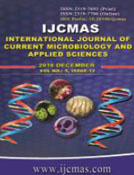


 National Academy of Agricultural Sciences (NAAS)
National Academy of Agricultural Sciences (NAAS)

|
PRINT ISSN : 2319-7692
Online ISSN : 2319-7706 Issues : 12 per year Publisher : Excellent Publishers Email : editorijcmas@gmail.com / submit@ijcmas.com Editor-in-chief: Dr.M.Prakash Index Copernicus ICV 2018: 95.39 NAAS RATING 2020: 5.38 |
Infectious diseases have become a major cause of morbidity and mortality worldwide. Antimicrobial resistance is a serious threat to global public health. Plant chemicals are useful for infection control and, until the advent of antibiotics, were the only remedies available. Plants are rich in a wide variety of secondary metabolites, such as tannins, terpenoids, alkaloids, and flavonoids, which have been found in vitro to have antimicrobial properties. Tropical almond, botanically equated as Terminalia catappa L. is a large spreading tree. In the present study, attempts were made to evaluate the antimicrobial activity of aqueous extract of different parts of this plant against bacterial and fungal species using disc diffusion method. Anti bacterial activity of bark was more against gram negative bacteria than gram positive. Aqueous extract of fruit revealed more efficacy towards gram positive organisms where as wood extract was equipotent against gram positive as well as gram negative organisms. Antifungal activity was more for fruits than bark and wood extracts. Activity of the extracts was compared with standard antibiotics.
 |
 |
 |
 |
 |